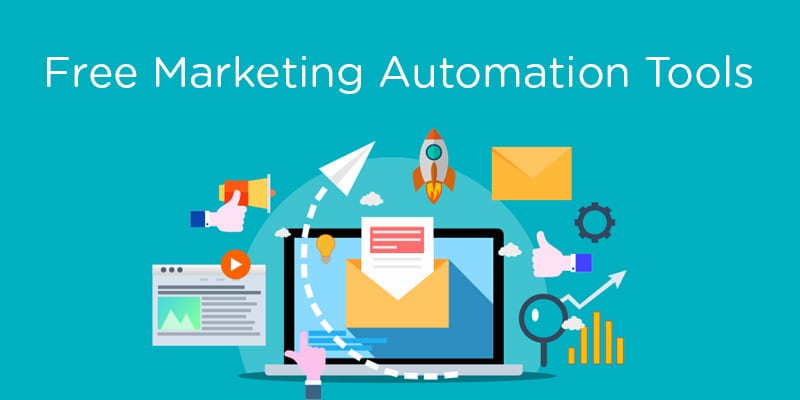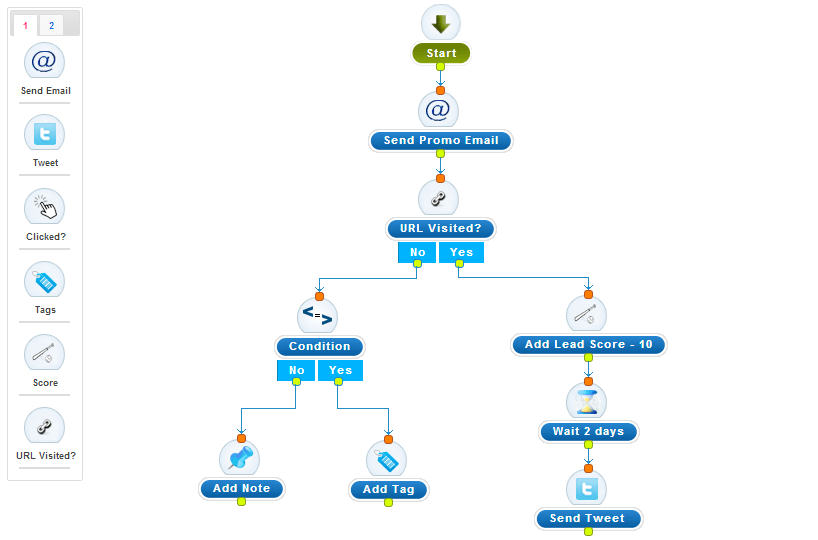Automated marketing tools streamline marketing processes through automation, saving time and increasing efficiency. They help businesses target audiences effectively.
Automated marketing tools offer immense benefits for businesses looking to optimize their marketing efforts. These tools can handle repetitive tasks such as email marketing, social media posting, and ad campaigns, allowing marketing teams to focus on strategy and creativity. With the ability to analyze data and personalize customer interactions, automated marketing tools enhance customer engagement and drive conversions.
They also provide valuable insights and analytics, helping businesses make informed decisions. By integrating these tools into your marketing strategy, you can improve productivity, achieve better results, and stay ahead in the competitive market. Embrace automation to elevate your marketing game and achieve sustainable growth.
Introduction To Automated Marketing
Automated marketing tools have revolutionized how businesses reach customers. These tools make marketing tasks easier and more effective. They help businesses save time and effort.
What Is Automated Marketing?
Automated marketing uses software to handle marketing tasks. These tasks include email campaigns, social media posts, and customer segmentation. The goal is to improve efficiency and effectiveness.
Automated marketing tools can send personalized messages to customers. They can track customer behavior and adjust strategies. This leads to better customer engagement and higher sales.
Importance For Modern Businesses
Modern businesses need to stay competitive. Automated marketing tools help them do this. They allow businesses to reach more customers with less effort.
- Save time: Automated tools handle repetitive tasks.
- Improve accuracy: These tools reduce human error.
- Enhance personalization: Tailor messages to individual customers.
- Increase sales: Better targeting leads to more conversions.
Using automated marketing tools is essential for growth. They help businesses stay ahead in a fast-paced market.
Key Benefits
Automated marketing tools offer many advantages for businesses. These tools help streamline marketing tasks, leading to increased efficiency and effectiveness. This section highlights some key benefits of using automated marketing tools.
Time-saving
Automated marketing tools significantly reduce the time required for repetitive tasks. For instance, you can schedule emails, social media posts, and other marketing activities in advance. This frees up valuable time for strategic planning.
A table below shows how much time you can save with automation:
| Task | Manual Time | Automated Time |
|---|---|---|
| Email Campaigns | 5 hours/week | 1 hour/week |
| Social Media Posts | 3 hours/day | 30 minutes/day |
| Lead Nurturing | 10 hours/week | 2 hours/week |
Improved Accuracy
Automation ensures tasks are performed with high precision. This reduces human errors and inconsistencies. For example, automated tools can segment your audience accurately. They ensure the right message reaches the right people.
Key areas where accuracy improves include:
- Email personalization
- Customer data management
- Campaign tracking and reporting
Enhanced Customer Engagement
Automated marketing tools enable personalized communication with customers. This leads to better engagement and satisfaction. You can automate responses, track customer behavior, and tailor content accordingly.
Benefits of enhanced engagement:
- Higher conversion rates
- Increased customer loyalty
- Improved brand reputation
By leveraging these tools, businesses can create more meaningful connections with their audience. Automated marketing tools empower businesses to operate more efficiently and effectively.
Popular Tools
Automated marketing tools have revolutionized the way businesses engage with customers. These tools save time, optimize tasks, and enhance marketing strategies. Let’s explore some of the most popular automated marketing tools available today.
Email Marketing Tools
Email marketing tools help you send personalized emails to your audience. They offer features like scheduling, segmentation, and analytics. Here are a few top choices:
- Mailchimp: Known for its user-friendly interface and robust analytics.
- Constant Contact: Excellent for small businesses with rich templates and ease of use.
- SendinBlue: Offers email and SMS marketing in one platform.
Social Media Automation
Social media automation tools manage your social media accounts effortlessly. They schedule posts, track engagement, and analyze performance. Here are some popular tools:
- Hootsuite: Supports multiple social platforms with detailed analytics.
- Buffer: Simple to use and great for scheduling posts.
- Sprout Social: Offers powerful social listening and engagement features.
Crm Integration
CRM integration tools help you manage customer relationships efficiently. They streamline communication and store customer data. Here are a few notable tools:
- Salesforce: Leading CRM with extensive features and customization.
- HubSpot: Free CRM with powerful marketing automation features.
- Zoho CRM: Affordable CRM with a wide range of integrations.

Credit: solutionsreview.com
Choosing The Right Tool
Choosing the right automated marketing tool can transform your business. It helps streamline processes, saves time, and boosts efficiency. The key is finding a tool that fits your specific needs.
Business Needs
First, identify your business needs. Different tools serve different purposes. Some tools focus on email marketing. Others excel in social media management. Consider your primary goals. Do you need better customer engagement? Or is lead generation your priority?
Create a list of essential features. For instance:
- Email automation
- Social media scheduling
- Analytics and reporting
- Customer Relationship Management (CRM)
Match these features with your goals. This way, you ensure the tool aligns with your business strategy.
Budget Considerations
Next, think about your budget. Automated marketing tools come in various price ranges. Some tools offer basic free plans. Others have premium features that come at a cost.
Here’s a quick budget breakdown:
| Price Range | Features |
|---|---|
| Free | Basic email campaigns, limited social media posts |
| $10 – $50/month | Advanced email automation, detailed analytics |
| $50 – $200/month | Full CRM integration, unlimited campaigns |
Assess what your budget allows. Ensure the tool provides value for its cost.
User-friendliness
Lastly, consider user-friendliness. The tool should be easy to use. A steep learning curve can slow down your team. Look for tools with intuitive interfaces.
Key aspects to consider:
- Onboarding process
- Ease of navigation
- Availability of tutorials and support
Choose a tool that your team can quickly adapt to. This ensures efficient and effective use.
Implementation Tips
Automated marketing tools can significantly enhance your marketing efforts. Proper implementation ensures you get the most out of these tools. Here are some tips to help you seamlessly integrate them into your business.
Setting Clear Goals
Define your objectives before implementing any tool. Identify what you want to achieve. This could be increasing website traffic, generating more leads, or improving customer engagement.
Use the SMART criteria to set your goals:
- Specific
- Measurable
- Achievable
- Relevant
- Time-bound
Clear goals help in measuring the tool’s effectiveness.
Training Your Team
Your team needs to understand how to use the new tools. Conduct training sessions to familiarize them with the features.
Use these steps for effective training:
- Provide comprehensive training materials.
- Organize hands-on workshops.
- Offer continuous support and resources.
Training ensures your team can fully utilize the tool’s capabilities.
Monitoring Performance
Regularly monitor the performance of your automated marketing tools. This helps in identifying areas for improvement.
Key metrics to track include:
- Conversion rates
- Click-through rates
- Customer engagement levels
Use analytics to gain insights and make data-driven decisions.
Implementing automated marketing tools requires a structured approach. By setting clear goals, training your team, and monitoring performance, you can maximize the benefits of these tools.

Credit: www.agilecrm.com
Common Challenges
Automated marketing tools offer numerous benefits, but they come with challenges. Businesses must navigate these to maximize tool effectiveness.
Initial Setup Costs
The initial setup costs for automated marketing tools can be high. Companies need to invest in software licenses, hardware, and staff training. A typical setup might cost thousands of dollars. Here’s a simple breakdown:
| Item | Estimated Cost |
|---|---|
| Software License | $500 – $2000 |
| Hardware | $1000 – $5000 |
| Staff Training | $500 – $3000 |
These costs can be a barrier for small businesses. It’s important to budget carefully and plan.
Learning Curve
Automated marketing tools come with a steep learning curve. Employees need time to understand and use the software effectively. The learning process includes:
- Reading user manuals
- Attending training sessions
- Practicing with the tool
Companies might face reduced productivity during this learning phase. It’s essential to provide adequate support and resources.
Data Privacy Concerns
Data privacy concerns are a significant challenge. Automated marketing tools often handle sensitive customer data. Businesses must comply with data protection laws like GDPR and CCPA. Key concerns include:
- Data breaches
- Unauthorized access
- Data misuse
Implementing robust security measures is crucial. Encrypt data, use strong passwords, and regularly update software to protect customer information.
Case Studies
Automated marketing tools can transform businesses. By implementing these tools, companies can enhance their marketing efficiency and drive growth. Let’s explore how different businesses have benefited from automated marketing tools.
Small Business Success Stories
Small businesses often operate with limited resources. Automated marketing tools can help them maximize their reach without breaking the bank. Here are a few success stories:
| Business Name | Industry | Tool Used | Results |
|---|---|---|---|
| Green Thumb Gardens | Gardening Supplies | Mailchimp | Increased email open rates by 30% |
| Urban Outfitters Cafe | Food & Beverage | Hootsuite | Gained 5,000 new followers in 3 months |
| Bright Minds Tutoring | Education | HubSpot | Boosted lead conversion by 50% |
Enterprise-level Implementations
Large enterprises face unique challenges. Automated marketing tools can streamline their complex operations. Below are some notable examples:
-
Company: Tech Innovators Inc.
Tool Used: Marketo
Outcome: Achieved a 20% increase in lead generation. -
Company: Global Retail Corp.
Tool Used: Salesforce Marketing Cloud
Outcome: Improved customer engagement by 40%. -
Company: Health First Network
Tool Used: Pardot
Outcome: Reduced campaign costs by 25%.
Future Trends
The future of automated marketing tools is bright. New technologies are changing the way businesses interact with customers. These tools are becoming smarter, faster, and more efficient. Let’s explore some exciting trends in automated marketing tools.
Ai And Machine Learning
Artificial Intelligence (AI) and Machine Learning (ML) are transforming marketing. These technologies can analyze vast amounts of data quickly. They help marketers understand customer behavior. This leads to more effective campaigns.
AI can automate repetitive tasks. This saves time and reduces errors. ML can predict customer trends and preferences. This means businesses can stay ahead of the competition.
Personalization At Scale
Personalization is key to customer engagement. Automated tools now offer personalization at scale. This means businesses can tailor messages for each customer. Personalized content drives higher engagement and conversions.
These tools use data to create unique experiences. Customers feel valued when they receive personalized offers. This boosts loyalty and repeat business.
Integration With Emerging Technologies
Automated marketing tools are integrating with emerging technologies. This includes the Internet of Things (IoT), blockchain, and augmented reality (AR). These integrations offer new ways to engage customers.
For example, IoT devices can provide real-time data. This data can be used to send timely offers. Blockchain ensures data security and transparency. AR creates immersive experiences that capture attention.

Credit: www.qltech.com.au
Frequently Asked Questions
What Are Automated Marketing Tools?
Automated marketing tools are software platforms that streamline and automate marketing tasks. They enhance efficiency, improve targeting, and boost campaign effectiveness.
How Do Automated Marketing Tools Work?
Automated marketing tools use algorithms and data to automate repetitive tasks. They enable personalized marketing, track customer behavior, and optimize campaigns.
Why Are Automated Marketing Tools Important?
Automated marketing tools save time, reduce manual effort, and enhance marketing effectiveness. They allow for personalized campaigns and data-driven decisions.
Can Small Businesses Use Automated Marketing Tools?
Yes, small businesses can benefit from automated marketing tools. They offer affordable solutions to streamline marketing efforts and boost ROI.
Conclusion
Automated marketing tools simplify tasks, boost efficiency, and enhance targeting. They save time and deliver results. Embrace automation to stay competitive. Start leveraging these tools to streamline your marketing efforts and achieve better outcomes. Elevate your marketing strategy with automation, and watch your business grow.
